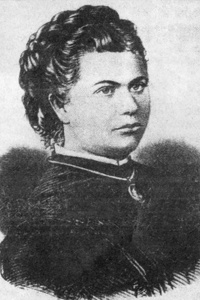Varvara Rudneva facts for kids
Quick facts for kids
Varvara Rudneva
|
|
|---|---|
 |
|
| Born | 1 January 1842 Chausy, Mogilev Province, Russian Empire
|
| Died | 1 January 1899 (Age 57) Staro-Preobrazhensky, Staraya Russa
|
| Other names | Varvara Kashevarova Rudneva |
| Occupation | Physician, Obstetrician and Gynecologist |
| Known for | First female medical doctor matriculated from a Russian medical school |
Varvara Aleksandrova Kashevarova-Rudneva (1842–1899) was a pioneering medical doctor from the Russian Empire. She was the second woman in Russia to become a doctor, following Nadezhda Suslova. Varvara Rudneva holds a special place in history as the first woman in Russia to complete her medical education at a Russian medical school. This was a huge achievement because, at that time, women were generally not allowed to study at universities, especially in medicine. She received unique permission to study because she wanted to treat women patients who, due to their religious beliefs, preferred not to be seen by male doctors. Her studies at the St. Petersburg Medical Surgical Academy and her later medical practice were very unusual for Russia. This brought her a lot of attention from both the medical world and the public, making her a well-known, though sometimes debated, figure.
Varvara's Early Life
Varvara Rudneva was born in the town of Chavusy in the Eastern Belarusian Region of Mogilev Province. After her mother passed away, Varvara moved with her father to Velizh Vitebsk province. Sadly, her father also died soon after, leaving her an orphan at a very young age.
For the first twelve years of her childhood, Varvara moved between different temporary families. At the age of twelve, she ran away and became very sick with typhus. After recovering in the hospital for many months, she made her way to St. Petersburg. She hoped to learn a skill to support herself. In St. Petersburg, she was briefly taken in by a seaman's family, where the son taught her to read. Later, a childless army surveyor adopted her.
Her adoptive father did not support her wish to get an education. At fifteen, she escaped by marrying Nikolai Kashevarov. However, he also broke his promise to let her study, so she left him after three years.
Her Journey to Education
Even without much formal schooling, Varvara Rudneva was determined to study medicine. In 1862, she joined a two-year program to become a midwife at the Princess Elena Pavlovna Lyinng-in Home. She was so bright that she finished the program in just eight months! Her professor, Dr. Veniamin Tarnovsky, was very impressed and supported her.
In 1864, it became against the law for women to take medical courses. This made Varvara's continued studies even more controversial. However, she was allowed to keep studying for her diploma. The only condition was that she would not receive the special academic rank that usually came with it.
Varvara received her physician's degree in 1868. Because she didn't get the academic title, she couldn't work at any hospital in Orenburg. She was then offered a job at the clinic of Sergei Petrovich Botkin. While working there, she married Mikhail Matveevich Rudnev in 1870. This marriage gave her the chance to do research in his pathology laboratory. She then decided to pursue the highest medical degree, the Doctor of Medicine diploma.
Career and Research
Varvara Rudneva became an expert in obstetrics and gynecology, which focuses on women's health and childbirth. Her scientific articles were published in important medical journals in both Russia and Germany. She made history again by becoming the first woman to be accepted into the "Society of Russian Doctors in St. Petersburg."
She had her own medical practice in St. Petersburg, Zheleznovodsk, and Voronezh Province. Besides her medical work, Varvara Rudneva was also a writer. She wrote a story called "Pioneer" and an autobiography titled "The history of women's medical education." She also wrote "Village notes."
Legacy
- A crater on Venus is named Rudneva in her honor.
See also
 In Spanish: Varvara Rúdneva para niños
In Spanish: Varvara Rúdneva para niños
 | Emma Amos |
 | Edward Mitchell Bannister |
 | Larry D. Alexander |
 | Ernie Barnes |

